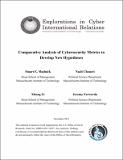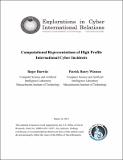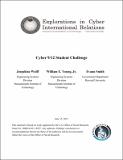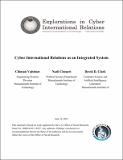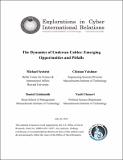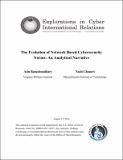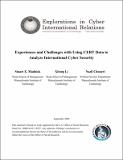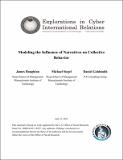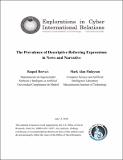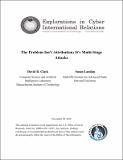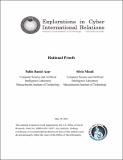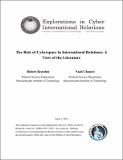Browsing Conference Proceedings by Title
Now showing items 1-20 of 29
-
Co-evolution of cyberspace and international relations: New challenges for the social sciences
(© International Political Science Association., 2013-10-13)Created by human ingenuity, cyberspace is a fact of daily life. Until recently, this arena of virtual interaction was considered largely a matter of low politics— the routine, background, and relatively non-contentious. ... -
Comparative analysis of cybersecurity metrics to develop new hypotheses
(© Elsevier B.V., 2011-11)Few Internet security organizations provide comprehensive, detailed, and reliable quantitative metrics, especially in the international perspective across multiple countries, multiple years, and multiple categories. As ... -
Computational representations of high profile international cyber incidents
(© International Studies Association, 2011-03-16)Several high profile incidents have shaped both popular and government understanding of international cyber conflicts. One of the most iconic is the distributed denial of service attack (DDoS) on Estonian government, media ... -
Control point analysis
(© TRPC, 2012-09-12)As the Internet becomes more and more embedded in every sector of society, more and more actors have become concerned with its character, now and in the future. The private sector actors, such as Internet Service Providers ... -
Corpus annotation in service of intelligent narrative technologies
(© Association for the Advancement of Artificial Intelligence, 2011-10-09)Annotated corpora have stimulated great advances in the language sciences. The time is ripe to bring that same stimulation, and consequent benefits, to computational approaches to narrative. I describe an effort to construct ... -
Cyber 9/12 student challenge
(© Massachusetts Institute of Technology, 2013-06-15)On June 15, 2013, the Atlantic Council’s Cyber Statecraft Initiative, with Science Applications International Corporation (SAIC), held the first student competition devoted to high-level policy recommendations for day-after ... -
Cyber international relations as an integrated system
(© INCOSE, 2012-06-18)International Relations (IR) – whether in pursuit of wealth or power – have been traditionally predicated upon the dominance of the State and the effectiveness of geographical boundaries. The Internet has shattered these ... -
Cyber politics: Understanding the use of social media for dissident movements in an integrated state stability framework
(© IEEE, 2012-08-19)Recent events in North Africa and the Gulf States have highlighted both the fragility of states worldwide and the ability of coordinated dissidents to challenge or topple regimes. The common processes of ‘loads’ generated ... -
The dynamics of undersea cables: Emerging opportunities and pitfalls
(© The System Dynamics Society, 2012-07-26)Cyberspace is built on physical foundations that support the “virtual” manifestations we know of and use in everyday computing. Physical infrastructure can include wired, fiber optic, satellite and microwave links, as well ... -
Empirical studies of bottom-up internet governance
(© TRPC, 2012-03-31)The notion of bottom-up governance in the Internet is not new, but the precise underlying mechanisms have received little primary, empirical study. The majority of Internet governance literature is couched in contrasting ... -
The evolution of network based cybersecurity norms: An analytical narrative
(© IEEE, 2014-08-13)We examine coordination dilemmas in cybersecurity policy by using an already developed evolutionary game theoretical model [2]. We suggest that norms to encourage network based security systems may not evolve independently ... -
Experiences and challenges with using CERT data to analyze international cyber security.
(© Elsevier B.V., 2009-09)With the increasing interconnection of computer networks and sophistication of cyber attacks, it is important to understand the dynamics of such situations, especially in regards to cyber international relations. The ... -
International data exchange and a trustworthy host: Focal areas for international collaboration in research and education
(BIC Annual Forum, 2011-11-29)A key message is the acknowledgement that international cooperation is nascent and a more global approach is urgently needed because there is ultimately just one, single global information environment, consisting of the ... -
Mechanism design with set-theoretic beliefs
(© IEEE, 2011-10-22)In settings of incomplete information, we put forward (1) a very conservative -- indeed, purely set-theoretic -- model of the beliefs (including totally wrong ones) that each player may have about the payoff types of his ... -
Mixed context and privacy
(© TRPC, 2010-08-15)Users engaging online service providers (OSPs) such as Google, Amazon, and Facebook encounter environments architected by a single actor (the OSP), but comprised of content and executable elements potentially provided by ... -
Modeling the influence of narratives on collective behavior
(© The System Dynamics Society, 2013-07-21)This paper considers the problem of understanding the influences of narratives or stories on individual and group behavior. Narrative theory describes how stories help people make sense of the world, and is being used to ... -
The prevalence of descriptive referring expressions in news and narrative
(© Association for Computational Linguistics, 2010-07-11)Generating referring expressions is a key step in Natural Language Generation. Researchers have focused almost exclusively on generating distinctive referring expressions, that is, referring expressions that uniquely ... -
The problem isn't attribution: It's multi-stage attacks
(© Association for Computing Machinery, New York, NY, USA, 2010-11-30)As a result of increasing spam, DDoS attacks, cybercrime, and data exfiltration from corporate and government sites, there have been multiple calls for an Internet architecture that enables better network attribution at ... -
Rational proofs
(© Association for Computing Machinery, New York, NY, USA, 2012-05-19)We study a new type of proof system, where an unbounded prover and a polynomial time verifier interact, on inputs a string x and a function f , so that the Verifier may learn f (x). The novelty of our setting is that there ... -
The role of cyberspace in international relations: A view of the literature
(© International Studies Association, 2012-04-01)This paper reviews the literature on cyber international relations of the previous decade. The review covers all journal articles on the role of cyberspace and information technology that appeared in 26 major policy, ...

